AFRICAN WOMEN
AFRICAN WOMEN
Early History to the 21st Century
Kathleen Sheldon

This book is a publication of
Indiana University Press
Office of Scholarly Publishing
Herman B Wells Library 350
1320 East 10th Street
Bloomington, Indiana 47405 USA
iupress.indiana.edu
2017 by Kathleen Sheldon
All rights reserved
No part of this book may be reproduced or utilized in any form or by any means, electronic or mechanical, including photocopying and recording, or by any information storage and retrieval system, without permission in writing from the publisher. The Association of American University Presses' Resolution on Permissions constitutes the only exception to this prohibition.
 The paper used in this publication meets the minimum requirements of the American National Standard for Information SciencesPermanence of Paper for Printed Library Materials, ANSI Z39.48-1992.
The paper used in this publication meets the minimum requirements of the American National Standard for Information SciencesPermanence of Paper for Printed Library Materials, ANSI Z39.48-1992.
Manufactured in the United States of America
Cataloging information is available from the Library of Congress.
ISBN 978-0-253-02716-0 (cloth)
ISBN 978-0-253-02722-1 (paperback)
ISBN 978-0-253-02731-3 (ebook)
1 2 3 4 5 22 21 20 19 18 17
Contents
Acknowledgments
AS WITH ANY big project, this book has been years in the making and has accumulated huge debts to many colleagues and friends. In 1975, as I began my graduate study in African history, I enrolled in one of the first courses offered in the United States on African women, a seminar on African women and social change taught by Margaret Strobel. We were barely able to find ten weeks worth of readings, but nonetheless, we held informative and lively discussions. By the time I was teaching similar courses in the 1980s and 1990s, the field had grown enormously, and there was an abundance of new articles, books, and collections to assign to students.
This textbook is completely dependent on the multitude of scholars who completed significant research and publications on African womens history. The wider cohort of feminist historians has been my community for decades, with too many friends in the Womens Caucus of the African Studies Association and elsewhere to name individually. African women scholars in particular brought new rigor and insight to African womens history, and I treasure their research and their friendship. Those who are directly cited are included in the bibliography, but they represent only a fraction of the books and articles I have been reading, enjoying, and debating for forty years. Writing this text would have been an impossible task without such a wealth of work to draw on.
Those who read and critiqued various early drafts saved me from embarrassing errors and contributed substantially to helping me focus and organize the masses of stories from across time and place. My husband, Steve Tarzynski, has lived with every step of my writing, and he was the first to read the entire manuscript when it was a messy draft. My son, Ben Tarzynski, had some helpful comments when he critiqued one chapter as I was making final revisions. Margot Lovett read an early chapter and later the entire text; Edna Bay also read the entire manuscript, and they both had many critical but helpful comments and insightful suggestions. I have gained so much from ongoing conversations about African history with Margot, Eddy, and Laura Mitchell as we have shared meals and book discussions over several years; their support and friendship undergirds much of my writing. The two colleagues who read the manuscript for Indiana University Press (an anonymous reader and Judith Van Allen) had observations that were immensely valuable as I worked through the final revisions.
I offer special thanks to several individuals and organizations who shared their photographs gratis for publication in this book; they are credited in the captions. Dee Mortensen, the editor for African topics at Indiana University Press, has been both patient with my delays and endlessly encouraging. I also appreciated the collegiality of sister scholars at the Center for the Study of Women at the University of California, Los Angeles. For many years, the center has supported research by independent scholars, and I was pleased to receive a Tillie Olsen Research Affiliates Grant for 20152016, which helped with costs related to producing this textbook, including acquiring some of the images.
The women of Africa, especially in Mozambique, inspired me to write their history. The stories of their work, their political actions, and their commitment to their families and communities have too often been marginalized or ignored. This book is my effort to bring their histories to a wider audience, with gratitude for all they have done.
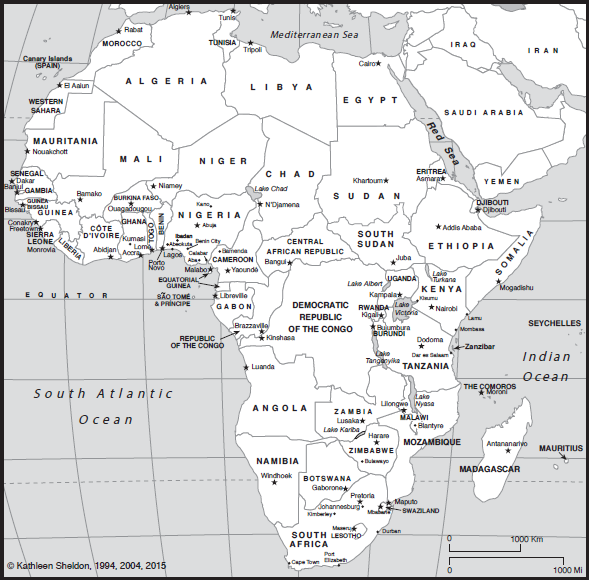
Map of Africa, 2015.
Introduction
AFRICAN WOMEN: EARLY History to the 21st Century presents a history of Africa with women as the starting point. The history of African women is a vital and successful field of study, growing from a small number of books and articles published in the 1960s and 1970s to the now thriving research that covers a huge range of places, times, and topics that has been achieved in the twenty-first century. In this book, coverage of important events and individuals documents womens involvement in critical episodes in African history, and it demonstrates how women have been central to well-known aspects of African history that are often seen solely from a male perspective. The inclusion of topics such as marriage, motherhood, womens work, and women as religious and political leaders, establishes the reality that knowledge of womens history is essential to making sense of African history more broadly.
Over many years of teaching and writing about African womens history, I encountered problems in two areas. Many textbooks on African history have neglected and marginalized women. Women are nearly absent in some books, and when they are included it is often in very limited and passive roles. At the same time, while the field of African womens history is strong, there has not been a textbook focused on African women that comprehensively covers the geographic, topical, and temporal breadth necessary to offer students and scholars a meaningful engagement with womens history. Many excellent books on African womens history are about a single country, a limited time period or topic, or are collections of articles that include a variety of approaches by different contributors. Two books that have been used widely in classrooms are now twenty years old, and they do not include the important new publications that have expanded and given nuance to research on African women. Given those issues and limitations in available African history texts, African Women: Early History to the 21st Century is designed to accomplish two goals.
My first objective was to write a comprehensive narrative of African womens history by bringing together information that is usually scattered and narrowly focused. Naturally, it is not possible to be completely inclusive because there is far too much research and information to easily compress into one book. African womens history is a vast topic that embraces a wide variety of societies in over fifty countries with different geographies, social customs, religions, and historical situations. Women enter the story with differences in their ages, marital statuses, education, work experiences, ethnicities, and rural or urban backgrounds. I have sought to include stories and histories that address the breadth of womens experiences, with sections on all regions of the continent and representing the variety of womens circumstances. I also approached the material as a historian and therefore, as much as possible, followed a chronological format while demonstrating how social and political change progressed over the centuries.
Next page

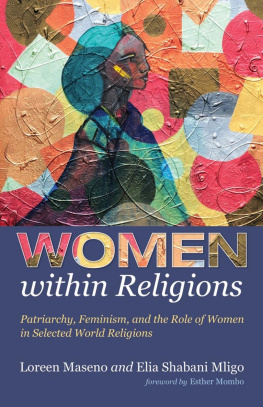
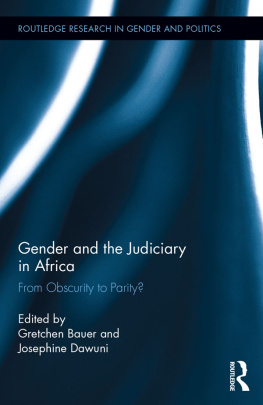
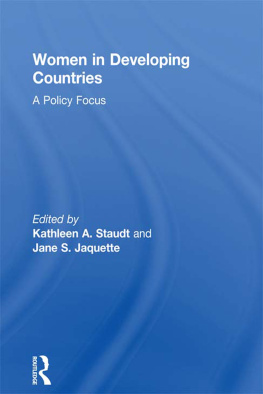
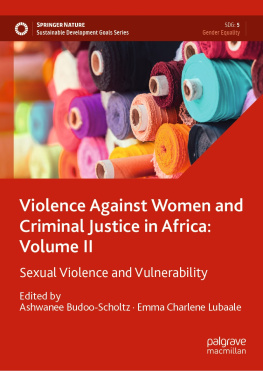
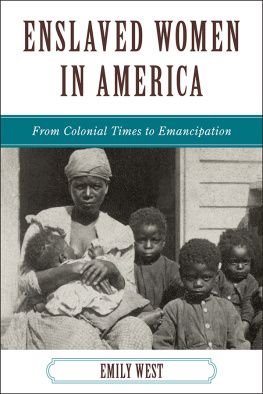
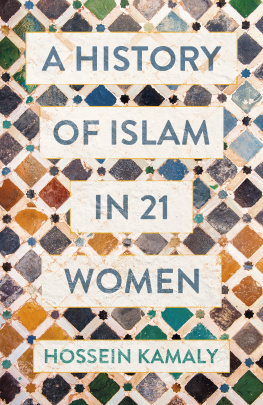
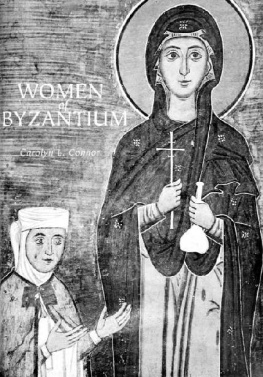

 The paper used in this publication meets the minimum requirements of the American National Standard for Information SciencesPermanence of Paper for Printed Library Materials, ANSI Z39.48-1992.
The paper used in this publication meets the minimum requirements of the American National Standard for Information SciencesPermanence of Paper for Printed Library Materials, ANSI Z39.48-1992.